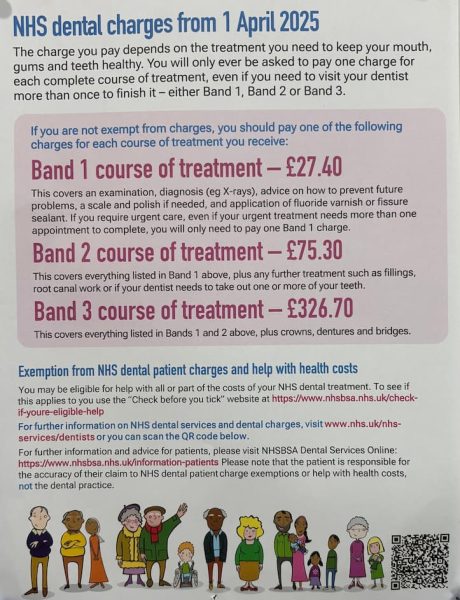NHS Treatments
The NHS provides the treatment which is clinically necessary to keep your mouth, teeth and gums healthy. This includes oral hygiene advice, PMPR (scaling), fillings, extractions, root-fillings, crown and bridgework and dentures.
Are NHS Treatments Right For Me?
Decisions about which treatment is appropriate will be based on your dentist’s assessment and clinical judgement. We are always fair and explain all your options, along with the risks and benefits of each.
Your dentist will make clear which treatments can be provided on the NHS and which can only be provided privately, and the costs associated for each.
You can get dental treatment on the NHS if you need it to keep your mouth and teeth healthy. You’ll usually need to get cosmetic treatments privately, these may include white fillings on your back tooth, tooth coloured crowns on molar teeth and a range of higher quality dentures.
The NHS provides the treatment which is clinically necessary to keep your mouth, teeth and gums healthy. This includes oral hygiene advice, PMPR (scaling), fillings, extractions, root-fillings, crown and bridgework and dentures.

Treatments
NHS Treatment Costs:
The NHS categorises dental treatments into three pricing bands:
- Band 1: This covers your initial consultation and examination. It includes diagnosis, x-rays and preventive care advice.
- Band 2: This includes everything in Band 1 plus additional treatments like fillings and extractions.
- Band 3: The most comprehensive, this band covers more complex procedures like crowns, dentures, and bridges.
- Band 4: Urgent dental treatment.
These prices are standardised across the NHS, ensuring that costs are predictable, no matter where you are treated in the UK. If you are not exempt from charges, you will pay one of the following charges for each course of treatment you receive.
The latest NHS fees come into effect from 5th April 2025.
- Band 1 £27.40
- Band 2 £75.30
- Band 3 £326.70
- Band 4 £27.40
NHS exemptions
Some exemptions will allow you free treatment or provide help with part of the costs of Exemptions that apply are listed on the NHS website www.nhs.uk/healthcosts
You do not have to pay for NHS dental treatment if, when the treatment starts, you are:
- aged under 18
- under 19 and receiving full-time education
- pregnant or a mother who has had a baby in the previous 12 months.
- you are named on a valid HC2 certificate
- you are included in an award of:
- income support
- income-related Employment and Support Allowance
- income-based Jobseeker’s Allowance
- Pension Credit Guarantee Credit
- Universal Credit (in the last assessment period there were no earnings, or earnings were within the allowed limit, please check at www.nhs.uk/healthcosts).
Please be aware: There is a change from 6th April 2025 that Tax Credit Exemption certificate will no longer entitle patients to free NHS treatment. We advise that you see if qualify for free treatment under a different benefit/exemption/remission
You will NOT be exempt from paying if you receive Incapacity Benefit, contribution-based Employment and Support Allowance, contribution-based Jobseeker’s Allowance, Disability Living Allowance, Council Tax Benefit, Housing Benefit or Pension Credit savings credit, when paid on their own. If you are unsure you can check on www.nhs.uk/healthcosts
Medical conditions do not exempt patients from payment for dental treatment.
